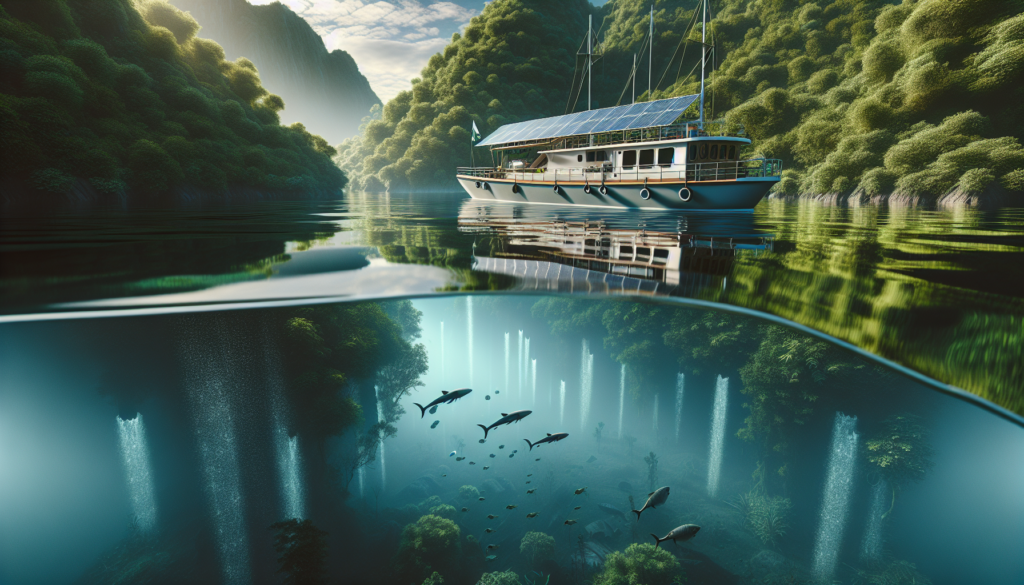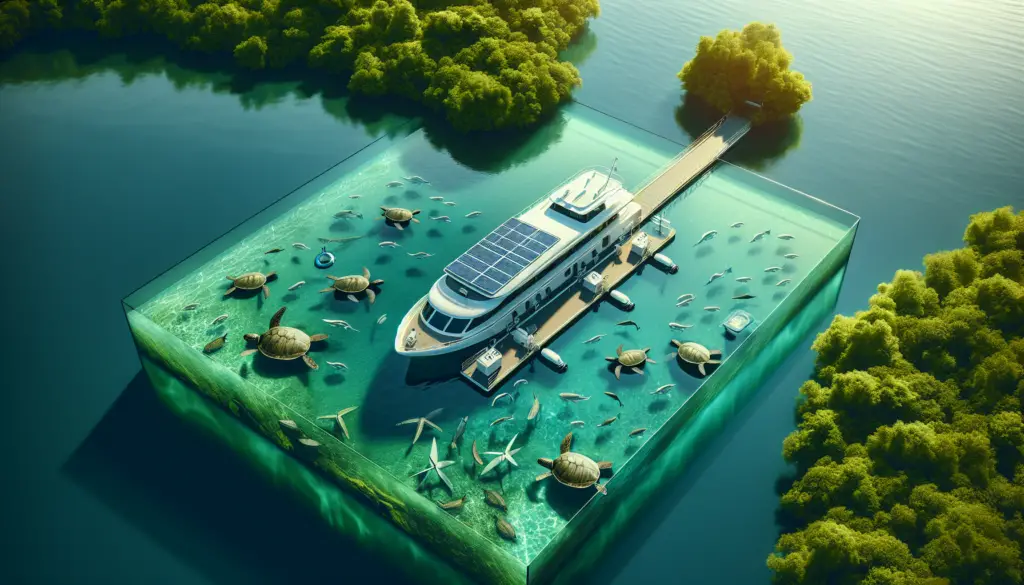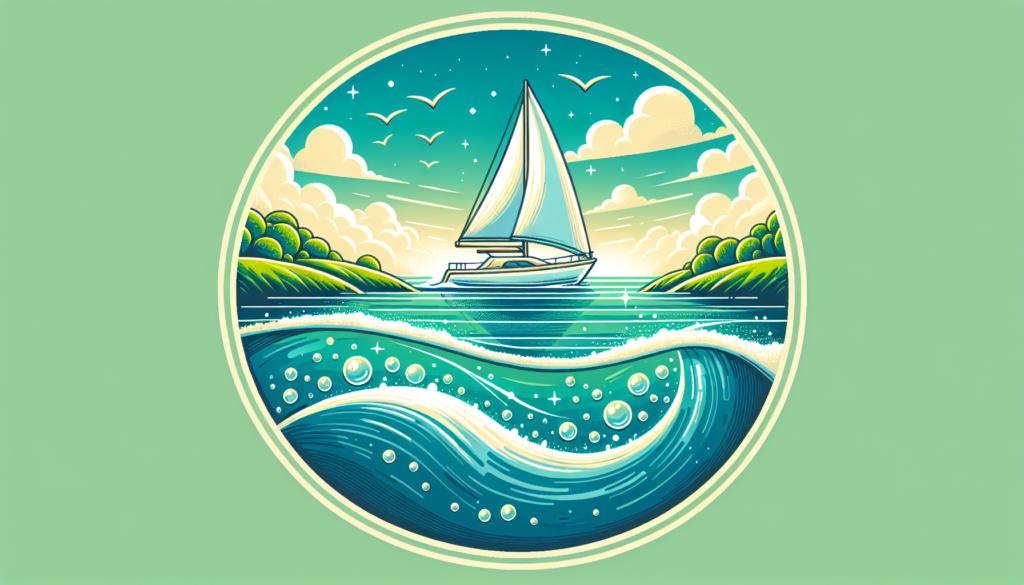Embarking on a journey across the water on your trusty boat can be one of the most relaxing and enjoyable experiences. The article “Improving Water Quality Through Eco-Friendly Boating Practices” offers an enriched understanding of how your sailing adventures can contribute toward preserving clean water. It enlightens you on simple yet efficient boat-handling techniques that substantially diminish the dangerous impact that boats could otherwise have on water environments. Discover how your hobby can morph into a powerful tool in combating water pollution; the article provides a unique perspective, combining your love for boating with responsible environmental stewardship.

Understanding the Impact of Traditional Boating on Water Quality
Understanding the environmental impact of traditional boating is crucial to appreciate the importance of more sustainable practices. When we think of boating, we often imagine a serene escape on sparkling waterways. Unfortunately, traditional boating practices can negatively impact the water quality and disrupt marine ecosystems.
Chemicals from boats and their effect on water ecosystems
Boats often release a range of chemicals that seep into the ocean, damaging water quality and aquatic life. These include fuel, oil, and waste from onboard activities. These chemicals can result in algae bloom, a rapid increase in the population of algae in an area. Algae bloom not only reduces the amount of oxygen available, leading to the death of many aquatic organisms, it also produces toxins that can harm or even kill marine life.
Boat debris and marine litter contribution
Debris from boats and marine litter are other significant factors degrading water quality. Items such as rope fragments, plastic wrappers, and fishing line can end up in the water, either accidentally or through irresponsible behaviour. These materials can directly harm marine animals through ingestion or entanglement. Furthermore, the decomposition of such debris also releases toxins, exacerbating chemical pollution in marine ecosystems.
Noise pollution and disturbance to marine life
The incessant noise from boating engines translates as noise pollution in aquatic habitats. It can cause confusion and distress among marine animals, interfering with their communication, reproduction, and navigation abilities. This form of pollution might not affect water quality directly, but it contributes majorly to the overall degradation of marine habitats.
Erosion caused by boating activities
Boating can also contribute to erosional processes. The wakes from boats, especially when they’re moving at high speeds, cause wave action that erodes shorelines and disturbs underwater habitats. This erosion can decrease water clarity, encourage the growth of harmful algal blooms, and destroy crucial habitats for aquatic species.
Introduction to Eco-friendly Boating
Eco-friendly boating, also known as green boating, is an alternative that minimizes the negative environmental impacts associated with traditional boating practices.
Definition and importance of eco-friendly boating
Eco-friendly boating encompasses a wide range of practices that aim to reduce boating’s environmental footprint. This includes using cleaner fuels, employing more sustainable materials, and embracing more sensitive behaviour towards marine life. It’s significant, not just for protecting marine ecosystems but also for preserving the enjoyment that boating offers for future generations.
The benefits of eco-friendly boating to water quality
Eco-friendly boating comes with tangible benefits to water quality. By minimizing the release of damaging chemicals and waste into the water, green boating helps maintain the balance of aquatic ecosystems. Moreover, it curtails the incidences of erosion and noise pollution, reducing stress on marine life and helping maintain a healthy marine environment.
Overview of eco-friendly boating practices
Eco-friendly boating practices range from simple daily habits to major decisions regarding boat design and equipment. They include using non-toxic cleaning products, adopting slower boat speeds, resisting the urge to discard waste overboard, and equipping boats with waste management systems.
Current industry efforts toward eco-friendly boating
The boating industry is increasingly embracing eco-friendly practices. Manufacturers are turning to more sustainable materials, developing cleaner engines, and promoting waste management systems for boats. Furthermore, various bodies offer certification programs encouraging marinas and boaters to adopt green practices.

Green Boating Equipment and Materials
Eco-friendly or ‘green’ boating equipment and materials are key components of sustainable boating practices.
Eco-friendly boat designs and materials
Eco-friendly boat designs aim to decrease fuel consumption and CO2 emissions. They often use sustainable materials such as recycled or bio-based fibres. Lightweight materials can also improve fuel efficiency, as can streamlined hull designs.
Green alternatives to traditional boat chemicals
Eco-friendly alternatives are available for many traditional boat chemicals. Non-toxic antifouling paints, fuel additives that reduce emissions, and biodegradable cleaning products are all ways boaters can reduce their impact on the environment.
Efficient engines and fuel-saving technologies
Many boat manufacturers now offer more efficient engines, helping to reduce both fuel consumption and pollution. Fuel-saving technologies such as solar panels and wind generators can also help to make boating greener.
Clean and renewable energy sources for boats
Clean energy technology has advanced significantly, and this extends to boating. Solar, wind, and even hydro-power can supplement or replace reliance on fossil fuels. These renewable energy sources are not only better for the environment, but they can also save boaters money in the long term.
Boating Operations and Maintenance
The way you operate and maintain your boat can significantly impact its environmental footprint.
Preventive maintenance to minimize environmental impact
Regular maintenance checks help prevent oil and anti-freeze leaks. Using drip trays to catch oils and other fluids can further prevent unintentional discharges into the water.
Proper waste disposal and recycling on boats
It’s important to ensure that waste generated on boats is disposed of correctly. Keeping recyclables separate, using onboard waste treatment systems, and disposing of garbage at designated marina stations are all excellent ways to manage waste on a boat.
Fuel efficiency strategies during boat operation
Different strategies can optimize fuel efficiency. These include keeping propellers clean and undamaged, maintaining the right balance of weight on the boat, and reducing speed.
Adopting slow boat speeds to prevent erosion
Maintaining slower speeds, particularly close to shorelines, reduces the wake’s erosional impact. This can also limit disturbances to marine life caused by noise and physical disruption.
Managing onboard noise to safeguard aquatic life
Simply turning off the engine when you’re not moving can significantly reduce noise pollution. Quieter engines, soundproofing materials, and regular maintenance can further reduce noise.

Use of Non-Toxic Products
Non-toxic products are essential for eco-friendly boating as they reduce the chemical footprint in water bodies.
Safe and biodegradable cleaning products for boats
Choosing cleaning products that are biodegradable and labelled safe for marine life is a simple but important step towards eco-friendly boating.
Non-toxic antifouling paints and treatments
Antifouling paints prevent the build-up of organisms on the hull. Non-toxic alternatives avoid releasing harmful metals and other toxins into the water.
Green materials for boat repair and maintenance
When repairing or maintaining your boat, consider using greener materials. These include water-based paints and solvents, metal-free antifouling treatments, and plant-based oils and lubricants.
Water Conservation Practices in Boating
Saving water is always beneficial, especially when you’re out on the water.
Effective water use and recycling systems onboard
Recycling systems can treat and reuse water on board for non-potable uses like washing and toilet flushing.
Minimizing water wastage during boat cleaning
Using high-pressure, low-volume systems for boat washing can significantly reduce water consumption. Alternatively, using waterless cleaning products can eliminate water use entirely.
Adhering to regulations for discharging ballast water
Ballast water, used to balance boats, can transport non-native species and diseases if discharged improperly. Adhering to local regulations is key to preventing these problems.

Marine Wildlife Protection
Just as we respect other people’s homes, we need to respect marine habitats as well.
Limiting boat speeds in wildlife populated areas
In places known for marine wildlife, reducing speeds can avoid disturbing or accidentally hitting creatures in the water.
Understanding and respecting marine life habitats
Learning about the local marine life and their habitats can help you to avoid disturbing them. Refrain from casting anchor in sensitive areas like coral reefs and seabed meadows.
Proactive measures against accidental wildlife strikes
Radar and other detection technologies can help prevent collisions with larger marine animals. Even just keeping a proper lookout can make a significant difference.
Promoting Boater Education and Training
Educating boaters about green practices is vital.
Boating education programs for eco-friendly practices
Many sailing schools now incorporate green boating training into their programs. These courses cover topics like pollution prevention, waste management, and marine life protection.
Continuous training for boat operators on green boating
Even seasoned boaters can benefit from ongoing training. This might include updates on new environmental regulations, eco-friendly products, or advances in green technologies.
Public awareness campaigns for responsible boating
Public awareness campaigns play an important role in spreading the message about Eco-friendly boating. They encourage everyone on the water to play their part in protecting our seas and waterways.
Advancing Policy and Regulation
Supporting green boating means also advocating for stronger environmental policies and regulations.
Existing environmental laws for boating
Many regulations and laws already exist that help to protect water quality from boating activities. These cover aspects such as waste disposal, use of antifouling paints, and discharges of oil and other pollutants.
Proposed policies for greener boating
Further regulations are needed to address other areas like noise pollution, wildlife disturbance, and use of renewable energy on boats.
Incentives for adoption of eco-friendly boating practices
Financial incentives and other rewards can encourage boaters and boat manufacturers to adopt greener practices. They might include discounts on marina fees for green boats or grants for installing renewable energy systems.
The Future of Eco-Friendly Boating
The future of green boating looks promising as technology, consumer awareness, and regulations evolve.
Development and innovations in green boating technology
Emerging technologies like electric boats, hydrogen fuel cells, and more efficient solar panels hold great promise for the future of green boating.
Consumer trends towards more sustainable boating
As boaters become more aware of the environmental impact of boating, many are seeking greener options. This increased demand will likely drive further innovations and adoption of eco-friendly practices.
Projections for the impacts of green boating on water quality
With wider adoption of green boating practices, we could see significant improvements in water quality. Reduced pollution and erosion, healthier marine life, and more, make for cleaner, safer, and more enjoyable waterways.
Improving Water Quality through Eco-Friendly Boating Practices is a shared responsibility – it’s up to all of us to do our part to protect our valuable water resources for future generations. It may involve learning new habits, trying new products, or even lobbying for legislative change. But in the end, the rewards – cleaner waters, healthier marine ecosystems, and a more sustainable boating industry – are more than worth the effort.


